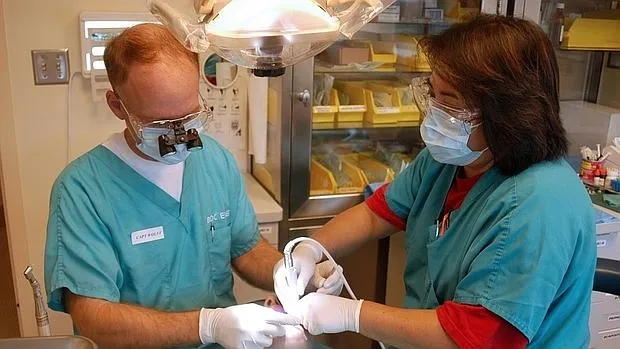According to the "White Book of Oral Health" in Spain, more than 40% of the Spanish population has passed in the last year through a dental clinic.
Most go to prevent, diagnose and/or treat an oral condition, but experts believe that the consultation of the oral health professional can be something else.
What if at the same time could your degree of risk be known to suffer cardiovascular disease?What if you could also receive orientations, instructions or advice to improve your general health?Or, even, what if it could be achieved from simple tests - such as glucose measurement - detecting such important disorders as diabetes?
That is what is intended with an innovative strategy from the Spanish Periodontics Society (SEPA).The objective of this project, seconded by the European Federation of Periodontics, is to convert the dental clinic into one more actor in the network of health services focused on promoting healthy lifestyle habits and preventing diseases."The relationship between periodontal health (of the gums) and general health forces us to propose that the dental clinics assume a greater role than the one played so far, adding to public health initiatives," said David Herrera, president, presidentknowing, during the presentation of the strategy.
As a cornerstone of this goal, SEPA has started collaborations with numerous medical scientific societies.In this context, the “mimocardium.Take care of your gums », a dissemination project as a result of the close collaboration between the Spanish Society of Cardiology (SEC) and SEPA, whose objective is, as Herrera explains,« Promote cardiovascular health and prevent coronary heart disease from the dental consultationAnd, at the same time, integrate oral health protocols into the hospital units of cardiac rehabilitation, given the growing evidence that associates gum diseases and cardiovascular diseases ».And, as Almudena Castro, president of the vascular risk and cardiac rehabilitation of the SEC, points out that the human being is a whole, so cardiovascular disease cannot be addressed without taking into account theoral health, and vice versa ».
Mimocardio
‘Mimocardio’ is an already consolidated initiative of the SEC, aimed at improving and enhancing communication between medical professionals and patients."It is about making the patient more participate in his care, of achieving greater involvement based on a better knowledge of his illness and the usefulness of the therapeutic advice and resources offered by his doctor," says Castro, project coordinator "Mimocardio ", who says that" it is an innovative initiative in the field of the so -called patient empowerment. "
In addition, it aims to sensitize the patient to actively collaborate (and together with the cardiologist) in the treatment and care of their heart disease, and follow the medical recommendations outside the hospital environment.
The success that "mimocardio" has had not only allowed the expansion of its coverage at the state level, but also the generation of new lines of work, where "mimopharmacies", "mimokids" are included and, now, "mimoencias", which, whichIt will be developed under the name of «Mimocardio.Take care of your gums ».And it is, as Dr. Castro emphasizes, “every time we have strongbody".
Every time we have more solid scientific evidence about the link between periodontal diseases andArteria Diseases.Almudena Castro
The project arises as a consequence of the work that the work group is performing "Cardiovascular and Periodontal Diseases Sepa".This initiative aspires to be the basis of greater collaboration and synergy between cardiology and periodontics, in terms of primary and secondary prevention, as well as health promotion.In addition, it assumes the important strategic value of the Dental Clinic, as a point for promoting healthy life and prevention of cardiovascular pathologies.
Although «Mimocardio.Take care of your gums »It has a clear social aspect, aimed at the general population, it is also framed within a collaboration initiative between scientific societies that represent broad and important groups of health professionals, all with the aim of ensuring a greaterLinking between them (cardiologists and dentists) to optimize the health of the population.
And, as Castro recalls, “the dentist must know that when periodontitis diagnoses a person, it will have an increased risk of suffering a heart disease and, therefore, should offer basic health advice and send him to his doctorof header »;For his part, Apostille, «the cardiologist before a person with high cardiovascular risk or who has already suffered a cardiac event (such as a myocardial infarction) must extreme the precautions and care of the gums, since this can have negative consequences in thecardiovascular risk, and must advise him to go to his dentist or periodoncist ».
According to the Guides of the European SOCIETY OF CARDIOLOGY, having periodontitis is a cardiovascular risk factor, which must be taken into account as others already well known, such as arterial hypertension, smoking or high cholesterol.


